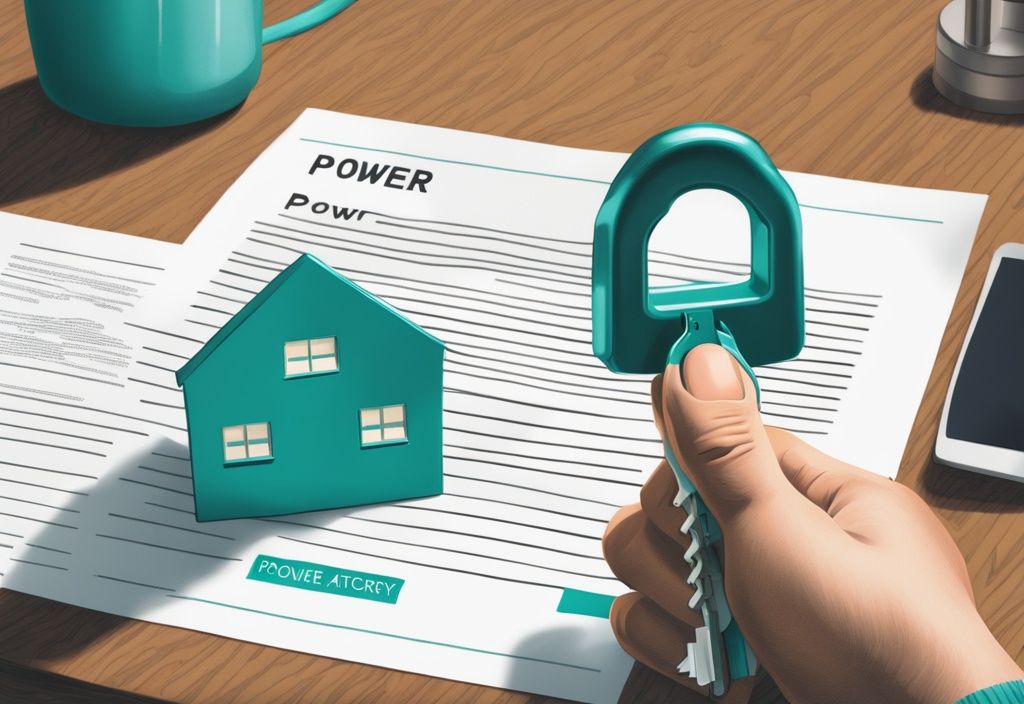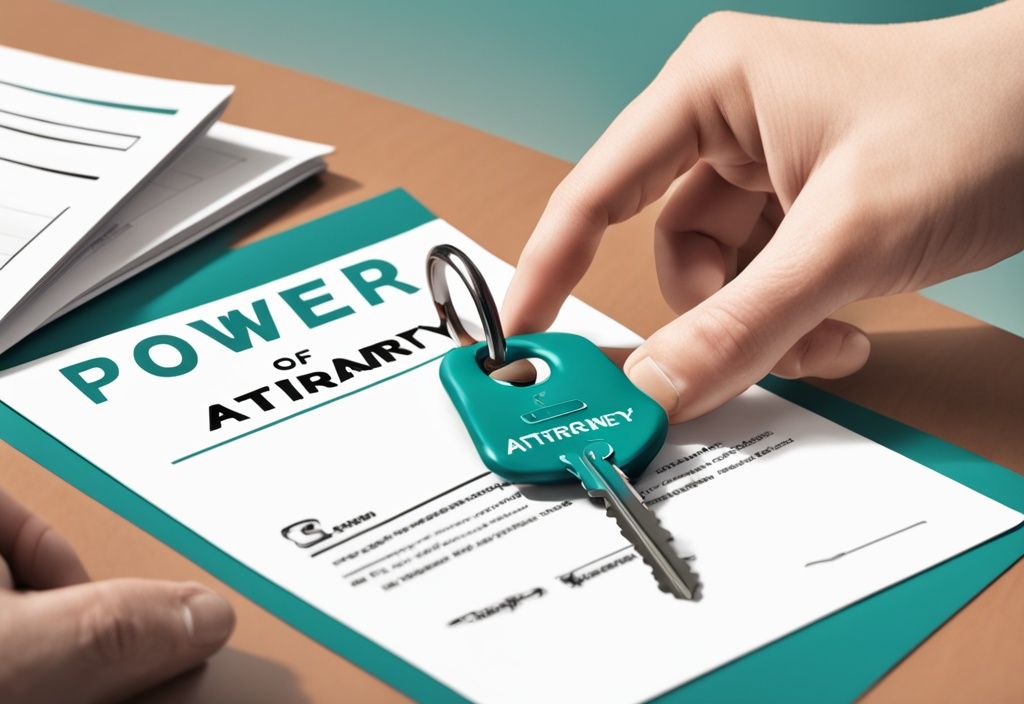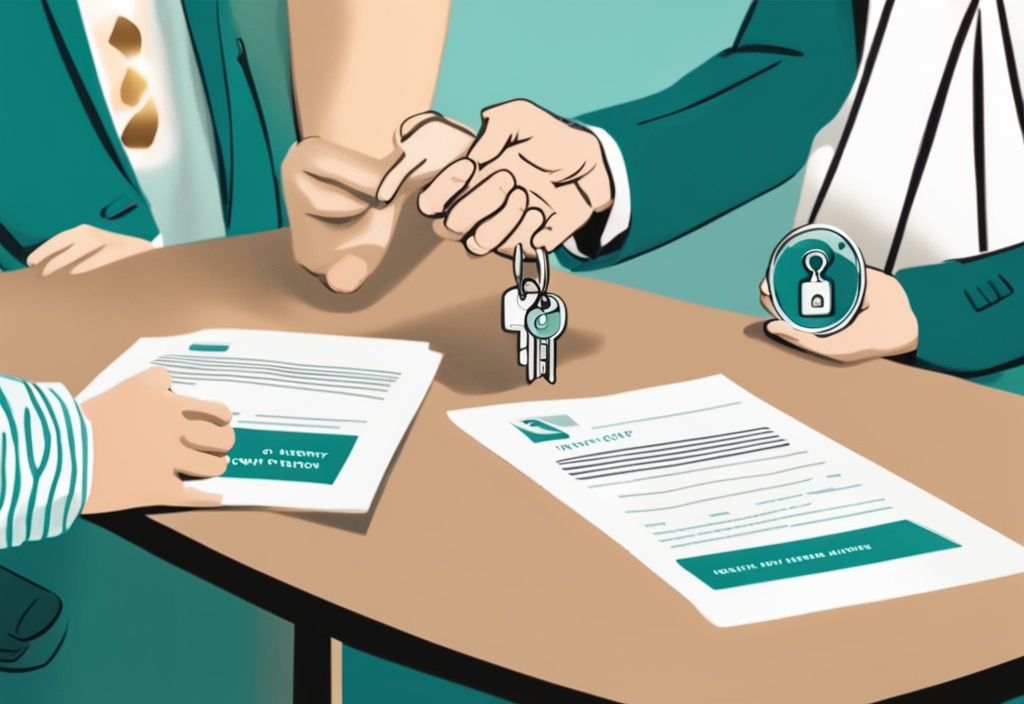
As a long-time real estate specialist, I know how confusing certain terms can be. Ever found yourself wondering, “What is POA in real estate?” You’re not alone. This is a common query for many property owners and investors.
In this article, we’re unearthing the ins and outs of POA. Be it exploring the intricacies of Property Owners’ Associations or understanding the legal benefits of Power of Attorney in real estate deals, it’s my mission to clarify these potentially baffling concepts for you.
With the right knowledge, you’ll be poised to navigate smoothly in the world of real estate, making informed decisions that protect your valuable assets. Let’s delve into the details together and turn a complex topic into digestible chunks of information.
Deciphering POA in Real Estate
Introduction to POA in Real Estate: Property Owners Association vs Power of Attorney
In the realm of real estate, “POA” stands for either Property Owners Association or Power of Attorney. Both are crucial but serve distinctly different functions. Let’s dive into what is POA in real estate and why understanding them is essential for property owners and investors.
A Property Owners Association (POA) is an organization that manages and governs a specific residential area or community, as defined in Texas statutes [here](https://guides.sll.texas.gov/property-owners-associations). It ensures the upkeep of common areas, orchestrates community events, and enforces rules and regulations to maintain property values and living standards. This type of POA includes not only homeowners but also business owners and property managers within the community.
Ever wondered how communities maintain such high standards? That’s where the Property Owners Association comes into play. They handle everything from landscaping common areas to organizing social events. Essentially, they work behind the scenes to make sure the community thrives. Imagine owning a property where the common spaces are always immaculate. That’s the magic of a well-run POA.
Now, switch gears to the Power of Attorney (POA) in real estate. This legal document authorizes an individual (the agent or attorney-in-fact) to act on behalf of another person (the principal) concerning property-related decisions. Think of it as a trusted hand, stepping in when you can’t be there. This can be crucial if the principal is unavailable to manage their affairs. Interesting, right? It’s like having a virtual presence.
So why does this matter? Understanding these two types of POAs can significantly benefit property owners and investors. It can enable informed decision-making and ensure efficient property management. Whether it’s maintaining community standards through a Property Owners Association or managing real estate transactions via a Power of Attorney, both forms of POA offer distinct advantages. When used appropriately, they enhance the overall experience of property ownership.
In conclusion, knowing what is POA in real estate can help you navigate the complex world of property management with ease. Picture a scenario where your community is flourishing because of a dedicated POA, or imagine the peace of mind knowing someone you trust can make critical decisions on your behalf through a Power of Attorney. Powerful tools, aren’t they?
Unraveling Property Owners Association (POA) in Real Estate
Understanding what is POA in real estate can provide clarity on community governance, financial responsibilities, and the distinctions between POAs and other associations.
The Purpose and Definition of Property Owners Association
A Property Owners Association (POA) is an organization established to manage and govern a community or residential area. The core aim of a POA is to foster community well-being, maintain communal spaces, and oversee shared amenities.
POAs are prevalent in various residential setups, including neighborhoods, condominiums, and rural areas. Understanding what is POA in real estate is crucial for both property owners and potential investors. This ensures they are well-versed in the operational framework and purpose of these associations.

Key Roles and Responsibilities of a POA
POAs have a comprehensive set of responsibilities that include a variety of management tasks. They are entrusted with the upkeep of common areas such as parks, playgrounds, swimming pools, roads, and entrance gates. Ensuring these facilities remain well-maintained and accessible is key.
Beyond maintenance, POAs enforce community rules and regulations designed to uphold living standards and protect property values. These associations also mediate disputes between residents to foster a peaceful and harmonious community environment. Moreover, POAs often organize community events and activities to enhance the quality of community life, encouraging social interaction and a sense of unity among residents.
Comparing POAs and HOAs: Spot the Differences
Both Property Owners Associations (POAs) and Homeowners Associations (HOAs) govern residential communities, but they differ in scope and function. POAs generally have a broader management scope, focusing primarily on the maintenance of common areas rather than individual property standards.
This distinction answers a frequent query about what is POA in real estate and how it differs from HOA structures. POAs encompass a wider membership, including not only homeowners but also business owners and property managers, providing a more inclusive community governance.
Furthermore, POA fees are predominantly used for common area maintenance and are typically lower compared to HOA fees that cover more extensive amenities and property regulations.
Fees, Budgeting and Financial Insights in a POA
A critical aspect of understanding what is POA in real estate involves delving into its financial management. POAs are responsible for budgeting and collecting fees from property owners, known as assessments, to fund essential services and projects.
POA fees are generally collected annually and are allocated towards the upkeep of common areas, addressing repairs, and funding community improvements. Understanding the combined fees for POA, HOA, or Condominium Owners’ Associations (COAs) is vital for property owners to manage their financial commitments effectively.
Financial transparency is a hallmark of well-functioning POAs. They offer detailed insights into how fees are utilized, which projects are financed, and ensure that all expenditures are comprehensively accounted for. This includes regular financial reporting and budget reviews in alignment with the community’s needs and priorities.
Decoding Power of Attorney (POA) in Real Estate
Power of Attorney (POA) in real estate is a crucial legal tool that empowers someone to handle property affairs on behalf of another. Whether you’re selling, buying, or managing real estate, understanding the different types of POA and how they function can be invaluable.
Understanding the Purpose and Definition of Power of Attorney
A Power of Attorney (POA) in real estate is a legal document allowing one person, known as the principal, to authorize another person, referred to as the agent or attorney-in-fact, to manage their real estate affairs. This can include selling, purchasing, or managing property on behalf of the principal. The scope of decisions the agent can make is clearly outlined in the document to reflect the principal’s wishes and can vary in terms of duration and comprehensiveness, being either temporary or permanent.
Exploring Types of Power of Attorney in Real Estate
To navigate real estate transactions effectively, it’s essential to understand the types of POA available and how each serves different needs.
Demystifying General POA
A General Power of Attorney grants the agent broad and unrestricted powers to act in real estate matters on behalf of the principal. This type of POA is comprehensive, enabling the agent to make a wide range of property-related decisions and actions without needing additional consent from the principal.
Comprehending Special or Limited POA
A Special or Limited Power of Attorney confines the agent’s authority to specific tasks or decisions as detailed within the POA document. This is particularly useful when the principal only needs help with certain transactions or property management aspects, ensuring precise boundaries on the agent’s powers.
Unraveling Durable POA
A Durable Power of Attorney remains effective even if the principal becomes incapacitated due to illness or injury. This ensures continuous management of the principal’s real estate affairs, providing peace of mind that their property matters will be handled according to their wishes, regardless of their health status.

Understanding Non-Durable POA
A Non-Durable Power of Attorney ceases to be valid should the principal become incapacitated. This type of POA is suitable for short-term or specific transactions where the principal’s ongoing competency is a vital requirement for the agent’s action on their behalf.
The Crucial Role of an Authorized Agent
The authorized agent, or attorney-in-fact, plays a critical role in executing real estate transactions and decisions on behalf of the principal. Because the agent will wield significant authority in managing the principal’s property affairs, it is imperative for the principal to select someone who is trustworthy and competent. The agent’s responsibilities might include signing agreements, handling financial transactions related to property, and ensuring the maintenance and value of the principal’s real estate assets.
Step-by-Step Process of Creating a Real Estate Power of Attorney
Creating a Power of Attorney for real estate involves several steps to ensure it is legally binding and meets the principal’s needs:
- Define the Scope and Duration: Clearly outline the extent of the agent’s powers and the duration for which these powers remain in effect.
- Draft the POA Document: Detail the specific tasks the agent is authorized to perform. This document should be comprehensive and precise to avoid any ambiguity.
- Signatures and Notarization: Both the principal and the agent must sign the document in the presence of a notary public and witnesses, following state-specific requirements.
- Recording the POA: Depending on state laws, the POA document may need to be recorded with the appropriate local authority to be enforceable.
- Regular Review and Updates: Periodically review and update the POA to reflect any changes in the principal’s real estate needs or preferences, ensuring ongoing relevance and accuracy.
Comparing Property Owners Association and Power of Attorney
When we look at the intricacies of real estate, we often encounter terms like Property Owners Association (POA) and Power of Attorney. Understanding these can demystify many nuances in real estate management and legalities. The following subheadings delve into comparing POA and HOA, and differentiating between a Power of Attorney and an Executor of Estate.
Key differences between a POA and an HOA
Understanding what is POA in real estate can really help highlight the distinctions between a Property Owners Association (POA) and a Homeowners Association (HOA). While both entities are crucial to community management, they serve unique roles. A POA manages common areas and shared amenities within a residential or mixed-use community. They focus on ensuring shared spaces, like parks, pools, and roads, are well-maintained. An HOA, on the other hand, not only manages these common areas but also exercises more control over individual property standards, enforcing rules related to property appearance, landscaping, and other specific homeowner responsibilities.
Another key difference is in their membership composition. POAs usually include not just homeowners but also business owners and property managers, reflecting a broader community involvement. This wider membership gives POAs a more comprehensive approach to community management. Conversely, HOAs focus solely on homeowners, emphasizing rules and regulations that directly impact residential properties. Additionally, you’ll often find that POA fees are generally lower than those of HOAs. Why? Because they primarily cover common area maintenance without getting into individual property oversight.
Difference Between a Power of Attorney and an Executor of Estate
The terms Power of Attorney and Executor of Estate often cause confusion, but they refer to distinct roles and scenarios, particularly when understanding what is POA in real estate. A Power of Attorney (POA) is a legal document that empowers one person, known as the agent or attorney-in-fact, to manage real estate and financial affairs for another individual, called the principal. This setup is essential for individuals who may be unavailable or incapable of handling these matters themselves due to reasons like location or health issues.
Types of POAs such as General, Special, Durable, and Non-Durable outline the specific powers granted and offer flexibility based on the principal’s needs.
Understanding how assets are organized, such as through a real estate subdivision, can be important for estate planning.
On the flip side, an Executor of Estate steps in after an individual’s death. This role involves tasks such as distributing assets, paying creditors, and filing necessary tax returns according to the deceased’s will or legal requirements.
Unlike a POA, which ceases upon the principal’s death, the Executor’s responsibilities kick in after death, ensuring the proper administration and closure of the decedent’s estate.
Practical Applications and Challenges with POA
Diving into the various avenues where a Power of Attorney (POA) plays a crucial role in real estate, we uncover its benefits, associated challenges, common usage scenarios, and preventive measures to mitigate potential risks. This nuanced understanding can help make informed decisions when leveraging a POA.
Benefits and Limitations of Living in a POA Community or Deploying a Power of Attorney
Living in a Property Owners Association (POA) community offers several perks. Imagine well-maintained parks, playgrounds, and swimming pools enhancing your quality of life and boosting property values. Community events and social activities foster a strong sense of belonging.
However, these advantages come with certain trade-offs. Compliance with community rules and paying designated fees can sometimes feel restrictive. It’s a balance between enjoying the amenities and adhering to the regulations.
Shifting gears to a Power of Attorney in real estate, this legal tool is invaluable for managing, selling, or purchasing property, especially when the principal is unavailable. Maybe they’re overseas or tied up with other responsibilities. While tremendously useful, trust is paramount. A poorly chosen agent could misuse their power, stressing the importance of clearly defining the scope and limits of the POA.

Common Real-life Situations for Utilizing a POA in Real Estate
One of the standout applications of a Power of Attorney in real estate is during property transactions where the principal is far from the property location. Imagine this: you’re overseas, and a lucrative property deal is on the table. A POA ensures that you don’t miss out on this opportunity.
Furthermore, for those in medical facilities or on active military duty, having an agent manage real estate transactions is a game-changer. It ensures ongoing property management and seizes opportunities without delay, proving especially crucial in fast-paced real estate markets.
Risks and Preventative Measures in Using a Power of Attorney
While a Power of Attorney is incredibly useful, it does carry risks. The potential for misuse or even fraud is real. Mismanagement by the agent can lead to severe financial and legal troubles for the principal.
To mitigate these risks, carefully selecting a trustworthy agent is essential. Clearly outlining the scope and duration of the agent’s authority helps in minimizing potential issues. Regular reviews and updates to the POA document are crucial in keeping everything in check. Consulting a legal expert adds an extra layer of protection, ensuring all necessary precautions are in place.
FAQ
Can a POA in real estate be temporary?
Absolutely, a POA in real estate can be designed to be temporary. Whether you need it for a specific period or particular transactions, it offers flexibility and control tailored to your needs.
Why might I need a Power of Attorney for real estate transactions?
A Power of Attorney (POA) for real estate transactions is invaluable when you can’t manage, sell, or buy property personally. It ensures continuity and seamless handling of your real estate matters, even when you’re not around.
Is a POA valid after my death?
In short, no. A Power of Attorney (POA) ceases to be valid upon the death of the principal. Afterwards, all responsibilities shift to the designated executor of the estate, who manages asset distribution and other related tasks.
How can I ensure my Power of Attorney doesn’t get misused?
To minimize the risk of misuse, choose a reliable agent. Clearly outline their powers and the duration in the POA document. Regular updates and professional legal advice can also provide added security.
Conclusion
Unleashing the True Power of Understanding POA in Real Estate
In the realm of real estate, understanding what is POA in real estate—whether it stands for Property Owners Association (POA) or Power of Attorney (POA)—is crucial for effective navigation. Each serves distinct purposes but holds significant influence over property management and ownership.
Being well-versed in the nuances of both types of POA ensures that property owners can make informed decisions about community management and legal affairs. Property Owners Associations play an essential role in maintaining and enhancing communal living environments through governance, maintenance, and community building efforts.
Conversely, Power of Attorney in real estate allows for seamless property management and transactions even when the owner is absent or incapacitated, adding a layer of flexibility and security.
Effective use of POAs can greatly enhance decision-making processes by delegating responsibilities to trusted individuals or entities. This not only protects property investments but also ensures smooth real estate operations, mitigating risks associated with absentee ownership or unexpected incapacity.
Ultimately, whether dealing with community rules governed by a Property Owners Association or leveraging a Power of Attorney for crucial decisions, understanding what is POA in real estate empowers property owners with the tools needed for superior property and community management.






